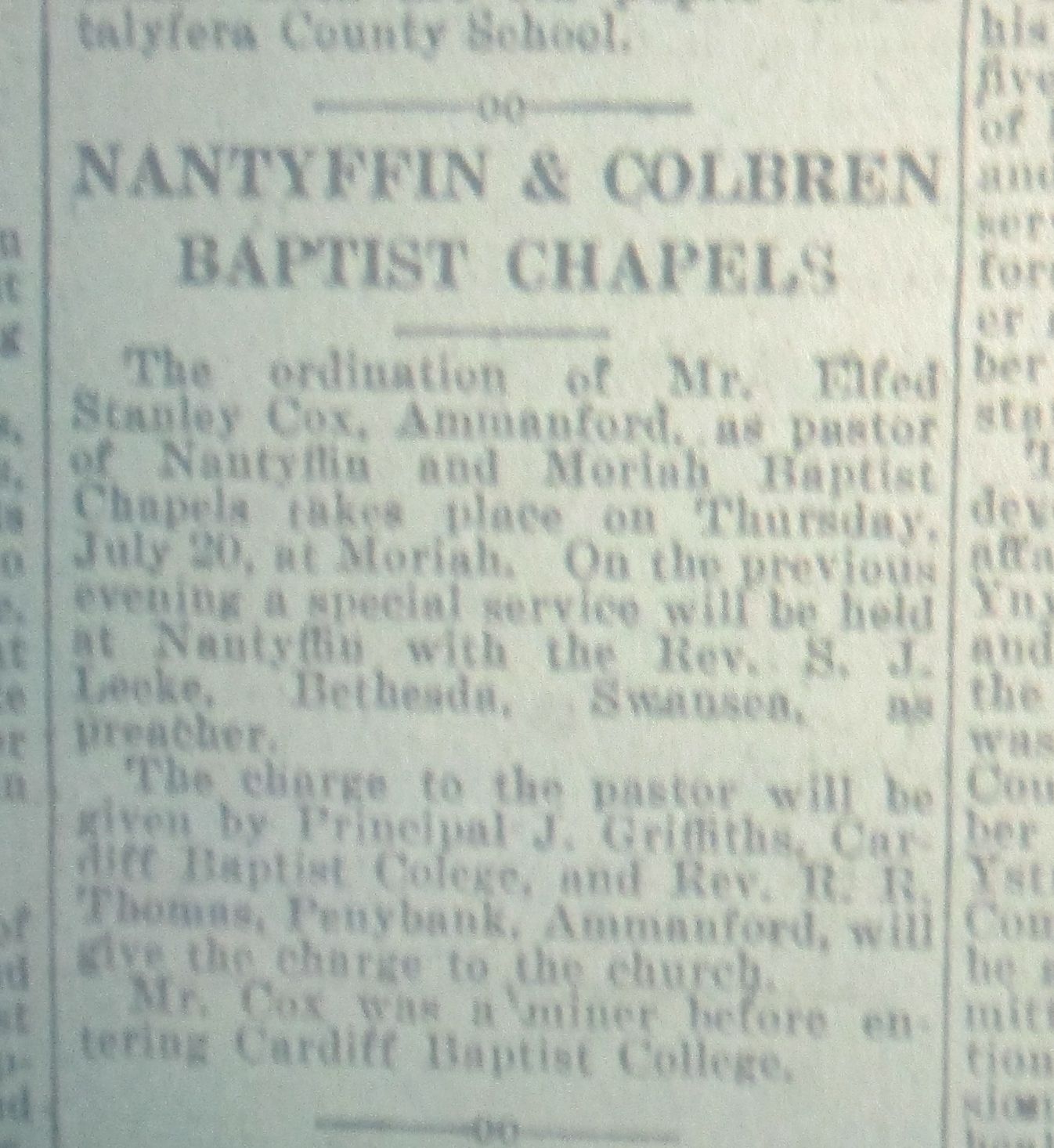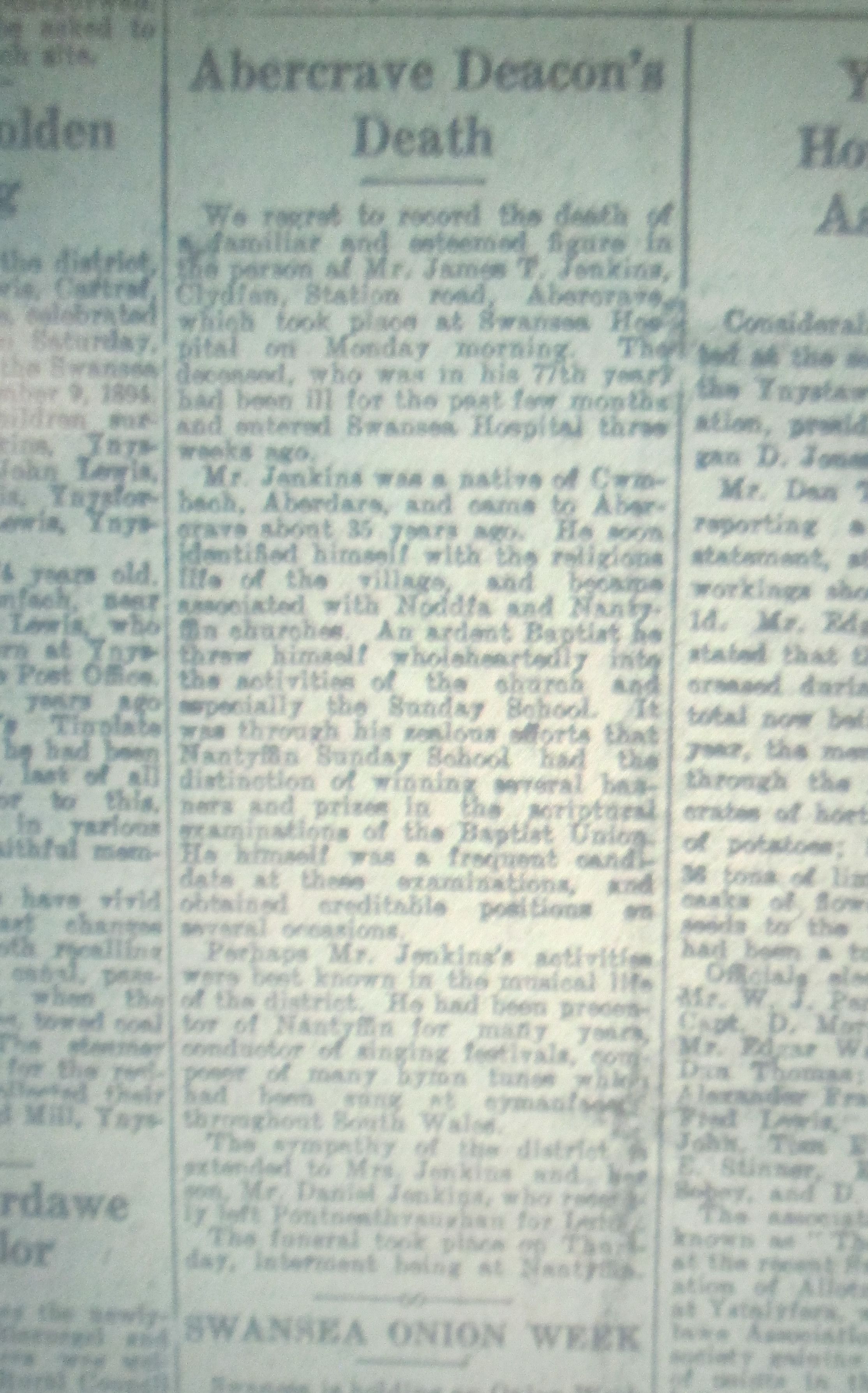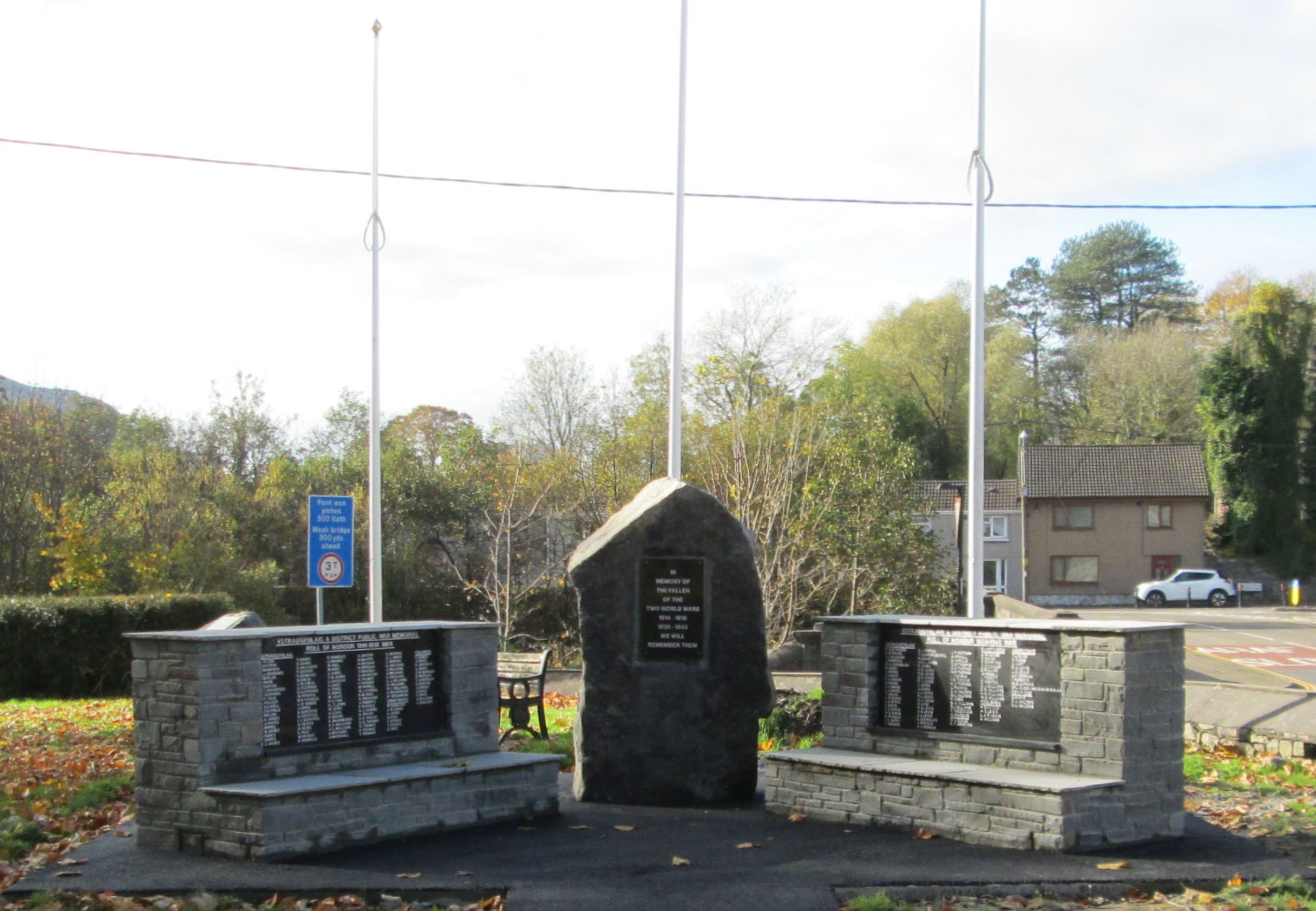Ystradgynlais & District
History and Heritage
Nant-y-Ffin Chapel, Penycae

Due to the condition of the building it was closed for services in the summer of 2011 but the upper cemetery remains open. Nant y Ffin Baptist Chapel Penycae was built in 1809 and renovated in 1833. The cause started in the house of Will Llewellyn in 1795.
Ministers of Nantyffin
Go to our full section on the Ministers of Nantyffin.
Between 1900 and 1917, the pastor of Nantyffin was also that for Noddfa Chapel, Abercrave, and between 1911 and 1913, and after 1922 he was also pastor of Moriah Baptist Chapel, Coelbren [not to be confused with Moriah Chapel, Penrhos, Ystradgynlais].
The Llais Llafur of 2nd May 1914 has an interesting story, regarding the famous Welsh bard Ben Bowen:-
LECTURE AT NANTYFFIN
There was a good audience at Nantyffin Chapel on Wednesday evening, when the Rev Robert Beynon B.A., Carmel, gave a very interesting lecture on "Ben Bowen", the famous young Welsh bard.
Mr Beynon is an authority on this eminent author, who was so persecuted for his alleged unorthodoxy and his lecture was all the more enjoyable by reason of his enthusiasm for the subject.
The Rev C J Pope presided, and the profits will be devoted to church funds.

Nant-y-Ffin Chapel, Penycae
From the South Wales Voice newspaper, August 6th 1933:-
Around The Churches
EFFECT OF GOOD INFLUENCES
Value of Obstacles in Life
CYRDDAU MAWR AT NANTYFFIN
The quaint old church at Nant-y-Ffin, Penycae, which has been the scene of many stirring sermons in the long years it has been in existence, was crowded on Sunday last, on the occasion of special services. People from over a wide area attended, and the atmosphere of old times was introduced. The singing, under Mr J T Jenkins, was very impressive.
The Sunday-school and Band of Hope at Nant-y-Ffin are well-known in the "Arholiad", and on the walls of the church are displayed banners gained in 1921, 1922, 1924-25.
The preacher at the services on Sunday was the Rev T.E. Williams of Rhymney, who recently retired after 43 years service in the ministry. Mr Williams was known as "The Boy Preacher" and is the vice-president of the East Glamorgan Baptists' Association, and is the secretary of the Rhymney Valley and District Welsh Baptist Churches.
Nantyffin is the mother church of all the Baptist causes in the upper parts of the Swansea and Dulais Valleys. Commenced in 1795, in a house called Glanrhyd, at the foot of Craigrhyw-rarth near Craigynos, the church was accepted in thet [sic] Gymanfa at Rhydwylim in 1796.
Worship was continued in dwelling houses until 1809, when the first chapel was built on land of Mr Llewelyn Powell, granted on a lease of 999 years. The chapel was rebuilt in 1834.
The first pastor was the Rev Dafydd Jones, of Ffynonhenry, who was inducted in 1811. Mr Jones held the pastorate for 14 years, although he continued to live at Ffynonhenry. The Rev W Morris, B.A., who is the present pastor, is the 14th in the cause.
Inside the building and above the pulpit are memorial stones to the Revs J. Roberts, who laboured there for 18 years, and D H Jones, "Gaius" both of whom were laid to rest in the graveyard attached to the chapel.
Taking his text from 2 Kings, 12, 21, Mr Williams said Elisha was one of God's best prophets under the old regime. From whatever direction he was regarded, his history was full of lessons that were of great use and help to the present-day generation. As a young man he was an object lesson in the manner in which obstacles should and can be faced. He was full of determination and that resulted in his reaching the high position he held at his death.
Elisha was a true son of the soil, having started his career at the plough, but he became the greatest influence in the country, while he was a fine character.
It was once said that the greatest compliment that could be paid to a young man was that he had risen from nothing; that he had "made" himself. In the case of Elisha, he, as other men, came to the world as a piece of clay, which he had to fashion to suit the circumstances. Character had also a large part in the matter. Out of the material at his disposal, Elisha made a column of granite, which withstood all tests that Time could impose. It was by means of his determination and energy that Elisha had worked his way from being a mere nonentity to the position of the leader of the people. It was plain to be seen in the account of his history that althrough Joash was king of Israel, the leadership rested with Elisha.
What Elisha had done, others could accomplish by serving the same God, and following in the same paths. Elisha took a great interest in young men, for he could see their possibilities. It was the duty of everyone to do what he or she could to leave the world better than he had found it. This could be seen in nature, as when a leaf fell from a tree another one was ready to take its place, as the older had prepared the way for its successor. How much more important was man than a leaf? Man was full of possibilities, and was definitely more superior than anything in the world. The church was really a nursery, in which prophets for the future were reared and nurtured.
ACTS OF KINDNESS
Elisha was well-known as the performer of miracles; it was a remarkable that all his miracles, except one, were all acts of kindness. The most wonderful miracle of his career was performed after his death. That was the subject of the sermon. He gave life to a dead man. There was something inspiring in the requests of some people to be near the saints of old. It could be called sentiment, but there was something extraordinary in it.
The text, which told of Elisha raising a man from the dead, showed that a man's life was greater than his need, and his influence had a longer span than his physical life. Although Elisha had been dead for many years his influence was so strong that it could perform such a wonderful miracle. That went to prove that death was not the end, as laid to rest, but his spirit continued to live in the influence of his life. That was true in the case of John the Baptist, who although he was beheaded by Herod, continued to affect the king. It was impossible ton bury the influence of the life of a good man.
There were actions we did in life, and occurrences that happened to us that we could not erase.
One of the most remarkable experiences that had ever befallen him, the speaker, was at an industrial school, where he addressed about 80 boys. He asked the boys how many of them regarded their parents as religious people and only 20 responded. Of that total, only three had a conception of what he meant. The replies given were that the parents of the boys in question prayed, and one little boy said his mother prayed for him when the policeman fetched him to go to the school. That had had an effect on the boy's mind, and was one of the things that could not be erased from the mind for all his life.
The words of a dying father to children to remember their duty had had a wonderful effect, and had been the means of keeping them on the straight path.
In the old days, the Romans erected statues to their heroes in war, and the children were taught to worship soldiers and to live in an atmosphere of militarism. The only statue that mattered in life was the good influence that was left when one passed away.
RESPONSIBILITY OF PARENTS
Parents were responsible to a large extent for the moulding of character as tnhis led to the influence referred to.
There was a possibility that parents did not do what they could in regard to the up-bringing of their children. Chapels and churches were emptying and cinemas were taking their places; this was not a desirable state of affairs, as it could be said that the atmosphere of the cinema would replace the infliuence that was provided upon one's life by worship in God's house.
The service was presided over by the pastor, the Rev W. Morris, B.A., who referred to the happy association he had had with the Rev T E Williams, who had helped him to prepare for the ministry. Mr Morris also spoke of the series of article on visits to churches i the district that appeared in the "South Wales Voice" each week, and said they were looked forward to by all the readers. Mr Morris extended a hearty welcome to Mr Jay Francis, representative of the "South Wales Voice" and said the report of the service would be eagerly anticipated.
Mr T J Walters was the organist.

Nant-y-Ffin Chapel Cemetery, Penycae
 From the South Wales Voice newspaper, July 1944 comes the news of the ordination of Elfed Stanley Cox as pastor at Nantyffin, as well as at Moriah, Coelbren:-
From the South Wales Voice newspaper, July 1944 comes the news of the ordination of Elfed Stanley Cox as pastor at Nantyffin, as well as at Moriah, Coelbren:-
NANTYFFIN AND COLBREN BAPTIST CHAPELS
The ordination of Mr Elfed Stanley Cox, Ammanford, as pastor of Nantyffin and Moriah Baptist Chapels takes place on Thursday July 20th at Moriah. On the previous evening a special service will be held at Nantyffin with the Rev S J Leeke, Bethesda, Swansea, as preacher.
The charge to the pastor will be given by Principal J Griffiths, Cardiff Baptist College, and Rev R R Thomas, penybank, Ammanford, will give the charge to the church.
Mr Cox was a miner before enrtering Cardiff Baptist College.

From the South Wales Voice newspaper, Saturday 16th September 1944 came the news of the death of a deacon of Nantyffin:-
ABERCRAVE DEACON'S DEATH
We regret to record the death of a familiar and esteemed figure in the person of Mr James T Jenkins, Clydfan, Station Road, Abercrave, which took place at Swansea Hospital on Monday morning. The deceased, who was in his 77th year, had been ill for the past few months and entered Swansea Hospital three weeks ago.
Mr Jenkins was a native of Cwmbach, Aberdare, and came to Abercrave about 35 years ago. He soon identified himself with the religious life of the village, and became associated with Noddfa and Nantyffin churches. An ardent Baptist he threw himself wholeheartedly into the activism of the church and especially the Sunday School. It was through his zealous efforts that Nantyffin Sunday School had the distinction of winning several banners and pries in the scriptoral examinations of the Baptist Union. He himself was a frequest candidate at these examinations and obtained creditable positions on several occasions.
Perhaps Mr Jenkins' activities were best known in the musical life of the district. He had been precentor of Nantyffin for many years, confuction of singing festivals, composer of many hymn tunes which had been sung at cymanfa [???] throughout South Wales.
The sympathy of the district is extended to Mrs Jenkins and his son, Mr Daniel Jenkins, who recently left Pontneathvaughan for [???]
The funeral took place on Thursday, internment being at Nantyffin.
From the South Wales Voice newspaper, 13th July 1946:-
NANTYFFIN BAPTIST CHURCH'S 150th ANNIVERSARY
The Church at Nant y Ffin celebrated its 150th anniversary on Wednesday and Thursday, 3rd and 4th of July. It was memorable occasion and those present will never forget the great spiritual atmosphere which prevailed from the very outset.
The services were conducted by the pastor the Rev E S Cox, who, in a few well chosen words welcomed all the visitors and old friends of Nant y Ffin.
On Wednesday evening the services opened with a reading and prayer by the Rev C J Pipe, Whitchurch, a former pastor of the church. This was followed by two powerful discourses from Prof Emlyn Davies Cardiff and Rev Herbert Morgan Aberystwyth, the latter having spent his early years in this district.
The chapel was filled to overflowing on Thursday afternoon when several speakers bore witness to the great work done by this little church in promoting the gospel throughout the valley of the Tawe. The pastor presided and the service opened with reading and prayer by the Rev Hubert Davies Ystradgynlais. The representatives of the various organisations were then called upon to say a few words.
The first speaker was County Councillor Howell Watkins J P who had been secretary of the church for many years and he gave an account of the progress of the cause during his long period of office. He was followed by Mrs Jones Dolycoed, speaking on behalf of Noddfa Abercrave. Mrs Jones who is well over 80, kept the congregation spellbound for over 10 minutes with her timely and well chosen words of hope and encouragement. Mr David Lewis J P Wernddu, spoke on behalf of Moriah, Colbren and described how the latter church was the fruit of the seed sown at Nant y Ffin. Other speakers included Mr Ithel Llewellyn, on behalf of Tynycoed; Rev W P Thomas, Cwmtwrch, on behalf of the West Glamorgan Baptist Association; and Mr Gwilym Phillips, Cwmtwrch on behalf of the Ystalyfera District Meeting.
The president then read out two very interesting letters, one from the Rev Richard Hopkins, Queens County Canada, who had been brought up in Nant y Ffin and another from Rev E D Lewis Ystalyfera, in which he regretted his inability to be present. Mr Tudor Watkins MP sent a telegram of congratulations from the House of Commons. After the singing of 'Y Delyn Aur' by the special request of the Rev Richard Hopkins, two short addresses were given by the Rev C J Pipe and Rev Herbert Morgan. A memorable service brought to a close by the singing of a well-known hymn and the benediction by the Rev Robert Beynon Abercrave.
Tea was provided between the services by the sisters of the church and great credit is due to them for the generous way in which they provided for the needs of all present.
The concluding service on Thursday evening, opened with a reading and prayer by the Rev D M Davies Tynycoed. Two heart searching sermons were preached by the Rev D H Morgan Clydach and Prof Emlyn Davies Cardiff, to a crowded congregation.
The service concluded with prayer by the Rev W Williams Blackwood Monmouthshire.

Nantyffin Chapel was the last Baptist cause in the area to still carry out total immersion baptisms in the River Tawe. This is a photograph from 1964, the last known time this occurred.
Nant-y-Ffin Chapel, Penycae

Chapels of Ystradgynlais
Coelbren
Crynant
Cwmllynfell
Email Yeargroup:
yeargroup@hotmail.co.uk
Email Wolfian Design:
webdesign@wolfianpress.com

Click the cover to purchase the paperback
How To Write Alternate History is a series of articles by Grey Wolf, examining subjects such as the identity of man, whether man makes the weather, how the everyday in an alternate world is going to be changed and what names for music, vehicles, weapons etc would be different.


From the South Wales Voice newspaper, August 6th 1933































